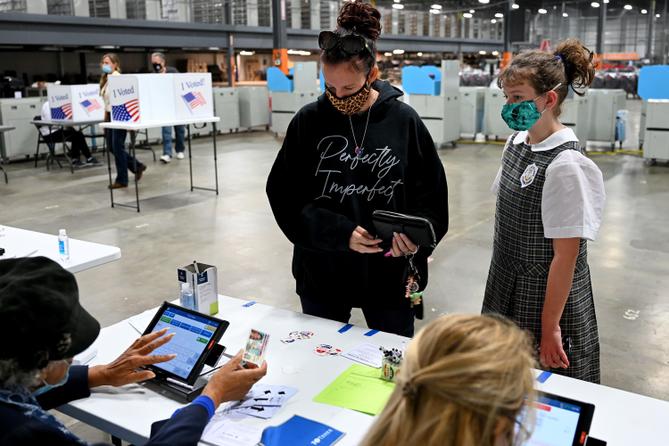Spotlight PA is an independent, nonpartisan newsroom powered by The Philadelphia Inquirer in partnership with PennLive/The Patriot-News, TribLIVE/Pittsburgh Tribune-Review, and WITF Public Media. Sign up for our free newsletters.
HARRISBURG — When Pennsylvania holds its 2022 general election in November, thousands of poll workers will ensure that voting runs smoothly. You could be one of them.
Counties are currently recruiting people to work at the state’s more than 9,000 voting locations. For many years, the Pennsylvania Department of State has voiced concerns over the lack of poll workers, a problem that was exacerbated by the pandemic.
Poll workers consider their work an opportunity to serve their state and community, meet new people, and learn about elections in Pennsylvania.
The Department of State accepts applications to become a poll worker on a rolling basis, but interested people should apply no later than Nov. 2.
Want to learn more? Here’s what you need to know:
The requirements
There are only a few requirements to become a poll worker. First, you must be a registered voter and you can serve only in the county in which you live.
High school students who are 17 years old may be eligible to volunteer if they meet specific requirements outlined by their county’s election office.
Second, poll workers cannot be current government employees or officials, except district judges, notary publics, or members of the Pennsylvania National Guard. Similarly, people whose names are on the ballot are not permitted to serve as poll workers, except for candidates for the local election board including judges of elections.
The duties
Poll workers must be available for the entirety of Election Day, before polling places open at 7 a.m. and after they close at 8 p.m.
Poll workers assist with the setup, opening, and closing of a polling place. They record the names of voters, check them in, and assist with election equipment.
There are a few specialized poll worker positions that are elected. Each polling place has a local election board comprised of a judge of elections, a majority inspector, and a minority inspector. All three positions help manage the polling place, keep track of the number of voters, and ensure that the results are received by the county election office.
Other specialized positions — such as the machine operator— support the local election board and are filled by appointment. They oversee the voting devices used at the polls.
Regular poll workers, or clerks, help check in voters, manage lines, and guide voters through each step of the process.
Poll workers are not partisan poll watchers, who are appointed by candidates or political parties and can challenge the eligibility of a voter (though they cannot directly question or speak to them).
The training
People who want to be poll workers must attend a mandatory training session in-person or online before Election Day.
Each county runs its own training, as voting systems vary. Some counties use optical scanners to process ballots, while others use different kinds of voting machines.
Counties also handle training for safety threats differently. According to the Department of State, every county addresses what to do in the event of general threats and disruptive behavior in the polling place.
Patti Hess, the director of elections in Fulton County, said there are constables at polling places in her county to ensure safety, and instructions for emergency situations are provided in a guidebook poll workers have on hand.
“If somebody comes in, it’s all in their book,” she said. “The sheriff’s office number is right there.”
Training materials for poll workers in Lancaster and York Counties direct poll workers to call local law enforcement for gun threats, bomb threats, and other emergency situations such as fires or loss of power.
Supplementary training courses for poll workers can be found online. They include videos and guides on checking in voters, inspecting voter identification, and accepting provisional ballots — those filled out by people whose eligibility cannot be immediately verified.
The pay
According to the Election Code, the statutory minimum pay for poll workers is $75 a day, with a maximum payment of $200.
Higher pay is typically reserved for elected positions. Poll workers who attend certain training events can be eligible for additional compensation. Overall, the allocation of pay is largely at the discretion of county commissioners.
How to sign up
If interested, you can apply by filling out a form on the Department of State’s website. Some counties have their own forms on their election websites. You can find your county’s website here.
The form asks for basic contact information and place of residency, as well as any special skills that could aid you as a poll worker, such as fluency in a foreign language.
That information is then sent to your county’s election office, which will reach out to you if it needs more workers. Jonathan Marks, Pennsylvania’s deputy secretary for elections and commissions, recommends reaching out to the county office if you haven’t heard back in 1-2 weeks.
You can find the contact information for your county here.
MORE ELECTION 2022 COVERAGE FROM SPOTLIGHT PA:
WHILE YOU’RE HERE… If you learned something from this story, pay it forward and become a member of Spotlight PA so someone else can in the future at spotlightpa.org/donate. Spotlight PA is funded by foundations and readers like you who are committed to accountability journalism that gets results.

